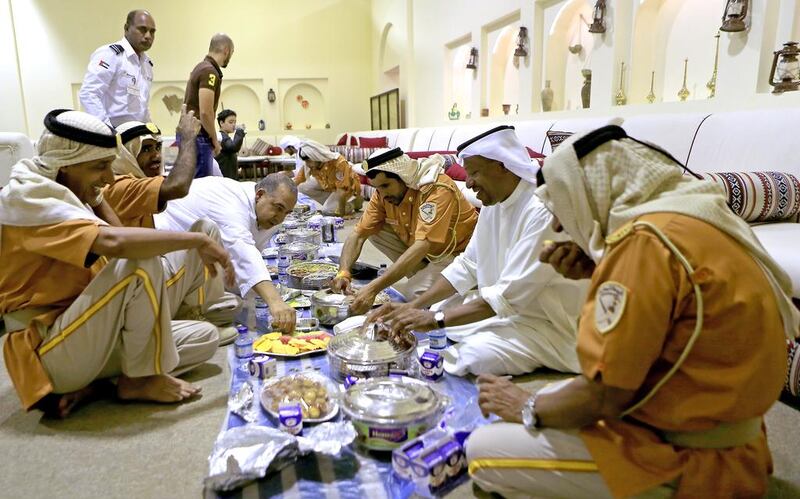ABU DHABI // The number of hospital patients with stomach problems has doubled since the start of Ramadan because of iftar overeating.
Emergency departments have also had an influx of people with kidney problems because of dehydration during fasting hours, and with food poisoning because of undercooked food: a third of emergency patients at Burjeel Hospital in Abu Dhabi during Ramadan have gastroenteritis.
Doctors say people are coming into hospital doubled over in pain. “You get a lot more suffering with abdominal pain because of the pattern of eating after fasting,” said Dr Biniam Tesfayohannes, head of the emergency department at Mafraq Hospital in Abu Dhabi.
“It is more or less double because of people eating in a very quick way immediately after fasting. Some people eat too huge an amount of carbohydrates. They get bloated. They get abdominal pains and they come in for that.”
Too many people do not break their fast sensibly, he said.
“Some people tell me they can not break the fast in a gentle way. While some will have some soup or juice, others will have a full meal. It is those who have a full meal that an hour or two later they get abdominal pain,” Dr Tesfayohannes said.
“It could be easily avoided if they did not eat so fast, so quick.”
Overeating at iftar is a problem every year, said Dr Magdi Mohamed, a specialist in emergency medicine at Burjeel Hospital.
“Most people are presenting with stomach problems,” he said. “They have gastroenteritis. They are vomiting, they have diarrhoea, abdominal pains.”
Dr Mohamed, who has 17 years experience in emergency medicine, said some patients come into the hospital bent over in pain. “It could be due to bad dietary habits,” he said.
“Do not rush to eat a large amount of food,” Dr Mohamed advised. “Gradually increase the amount of food you are taking. Take warm fluids. We advise during suhoor to take a light meal. Take care of the food hygiene.”
Dr Tesfayohannes said Muslims suffering from dehydration during Ramadan also put a burden on Mafraq Hospital’s emergency department, as does a high volume of car crashes, especially in the pre-iftar rush.
“It gets slightly more concentrated just before iftar when you get people rushing around,” he said.
But he said a previous trend of chronic patients, such as diabetics, avoiding taking their medicine while fasting during Ramadan – causing health complications and a rise in emergency room admissions – has stemmed thanks to more awareness campaigns.
“There is fairly extensive literature now,” he said. “The majority are instructed by their pharmacists that they can take their medicine and still abide by their fasting.”
Dr Salwan Ibrahim, Middle East medical director for International SOS, a company of experts in global health issues, said there were simple rules Muslims could follow to stay healthy during Ramadan.
“That means staying hydrated, eating wisely and making sure to take sufficient rest,” he said.
“Fasters should adopt routines gradually and be moderate in their eating and drinking habits during the hours of darkness.”
When breaking the fast, it is important to avoid large intakes of sugar and fatty foods, which can disturb the metabolism and cause dizziness, headaches and fatigue, he said.
Dr Ibrahim advises breaking the fast with small portions of food, such as some yoghurt, water and a few dates and then waiting 10 minutes before consuming more food, which should be rich in minerals.
jbell@thenational.ae





